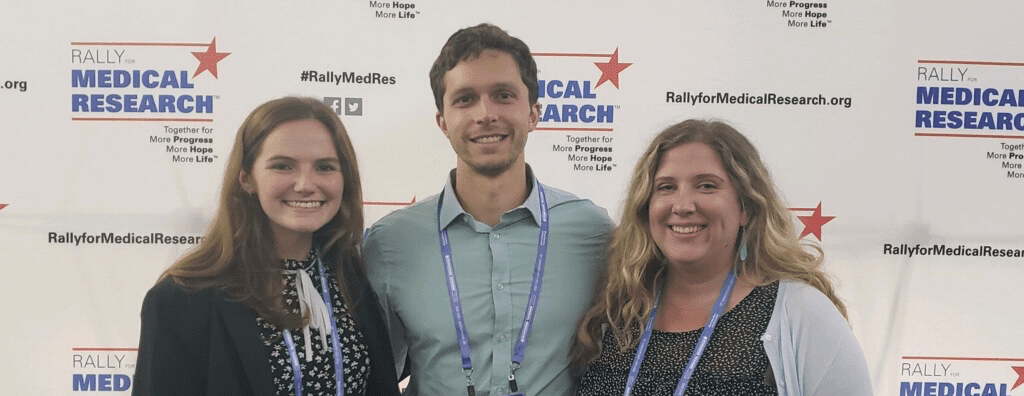
In September, ASHG members took part in the 10th annual Rally for Medical Research. This event is an opportunity for the research community to unite, advocate, and celebrate the potential science has to improve human health. ASHG is proud to have again sponsored this event on Capitol Hill, which brought together 250 participants from more than 30 states and Washington, D.C. to meet with 190 congressional offices. Advocates were enthusiastic to return in-person to the capital to ask Congress for robust, sustained, and predictable funding increases for the NIH in fiscal year (FY) 2023. The steady increases in NIH funding over the past seven years is not an accident; it is because of science advocates sharing their stories and personal connections to biomedical research that we have seen this growth.
ASHG Members Joined in Fall Advocacy Efforts; Why it is Important to Share Your Voice
Several members of ASHG’s Advocacy Certificate for Human Genetics and Genomics Trainees (ACGT) Program joined the Rally for Medical Research and shared with congressional offices how investing in NIH improves health, drives economic activity, and saves lives. Genetic counselor Sofia Horan, MS, CGC, shared, “We were able to have dynamic conversations with legislative staff about the need for increased NIH funding and how we have all seen that funding help our research and our patients’ lives.” Clinical fellow, Kristen Lancaster, MD, said, “I truly believe we made a difference by meeting with our senators and representatives on Capitol Hill.” Postdoctoral researcher, Kenneth Westerman, PhD, added that he was struck by the diversity of people who care about NIH funding. He observed that this diversity made the Capitol Hill meetings that much more impactful. He also noted that the congressional staffers were thrilled to hear stories from people conducting the research, implementing the research in the clinic, and being impacted by the resulting medical breakthroughs.
ASHG members are in the unique position to directly convey the benefits of human genetics and genomics research to policymakers. It is critical to continue to engage with Congress because decisions happen on the Hill that affect research and the use of genetics-based technologies – with or without input from researchers or other experts. Cynthia Morton, PhD, Chair of the ASHG Government & Public Advocacy Committee (GPAC), said, “We have an opportunity to communicate the excitement of human genetics and genomics research to policymakers and share how robust federal research funding can ensure all people benefit from scientific discoveries.” Dr. Morton added that scientists as advocates can have a powerful role to embolden scientific initiatives, push for evidence-based decision-making, and serve as a force for good.
ASHG Continues Engagement with Congress; Looks Ahead to Opportunities in 2023
Alongside our partner organizations, ASHG continues to engage the 117th Congress in support of robust federal research funding. Remaining on the agenda is FY 2023 appropriations; Congress did not pass a final spending bill by September 30, opting instead to pass a continuing resolution to extend current government funding levels until December 16. With limited time for the current Congress to come to an agreement before the end of the calendar year, nearly 300 members of the Ad Hoc Group for Medical Research, including ASHG, sent a letter to House and Senate Appropriations Committee leaders urging swift passage of a final FY 2023 Labor-Health and Human Services-Education spending bill, and asked that it include at least the House Appropriations Committee-passed $47.5 billion for the NIH base budget.
Looking ahead to 2023, ASHG is preparing to hold introductory meetings with key congressional staff for the new 118th Congress and share resources on human genetics and genomics research. There will be at least 15 new Chairs or Ranking Members impacting 14 different House and Senate Committees, including ones that have significant impact on research and academic medicine. There will also be several opportunities for bipartisan compromise, such as authorizing the Advanced Research Projects Agency for Health (ARPA-H), implementing the CHIPS and Science Act, and addressing U.S. competitiveness. ASHG is working to ensure that any proposed legislation in the new Congress does not impose undue restrictions on research. ASHG also remains committed to educating Congress and other policymakers about the genomics community’s active work to balance privacy and security with vital data-sharing that drives genomic discovery. With our advocacy partners, ASHG will continue to call on our nation’s policymakers to make funding for NIH a national priority, raise awareness about the importance of continued investment in medical research, and share the potential and promise of human genetics and genomics research.
How You Can Get Involved
Become an ASHG Advocate and sign-up for our e-newsletter; learn more about ASHG’s policy priorities and advocacy activities by visiting our advocacy page. Consider nominating yourself or interested colleagues to the GPAC; ASHG’s Capitol Hill Day is organized by the GPAC as part of the Board-approved Action Plan. Participation in ASHG’s annual (virtual) Capitol Hill Day is a benefit for members of the GPAC as well as participants in the ACGT Program. If you are a trainee member, consider applying to the Advocacy Certificate for Human Genetics and Genomics Trainees (ACGT) Program; applications are due by January 6, 2023. Through the activities of the GPAC, ASHG seeks to highlight the role of the genetics and genomics research field in translating science into beneficial application and communicating with the public and policymakers about the value and responsible use of genetic and genomic knowledge.
